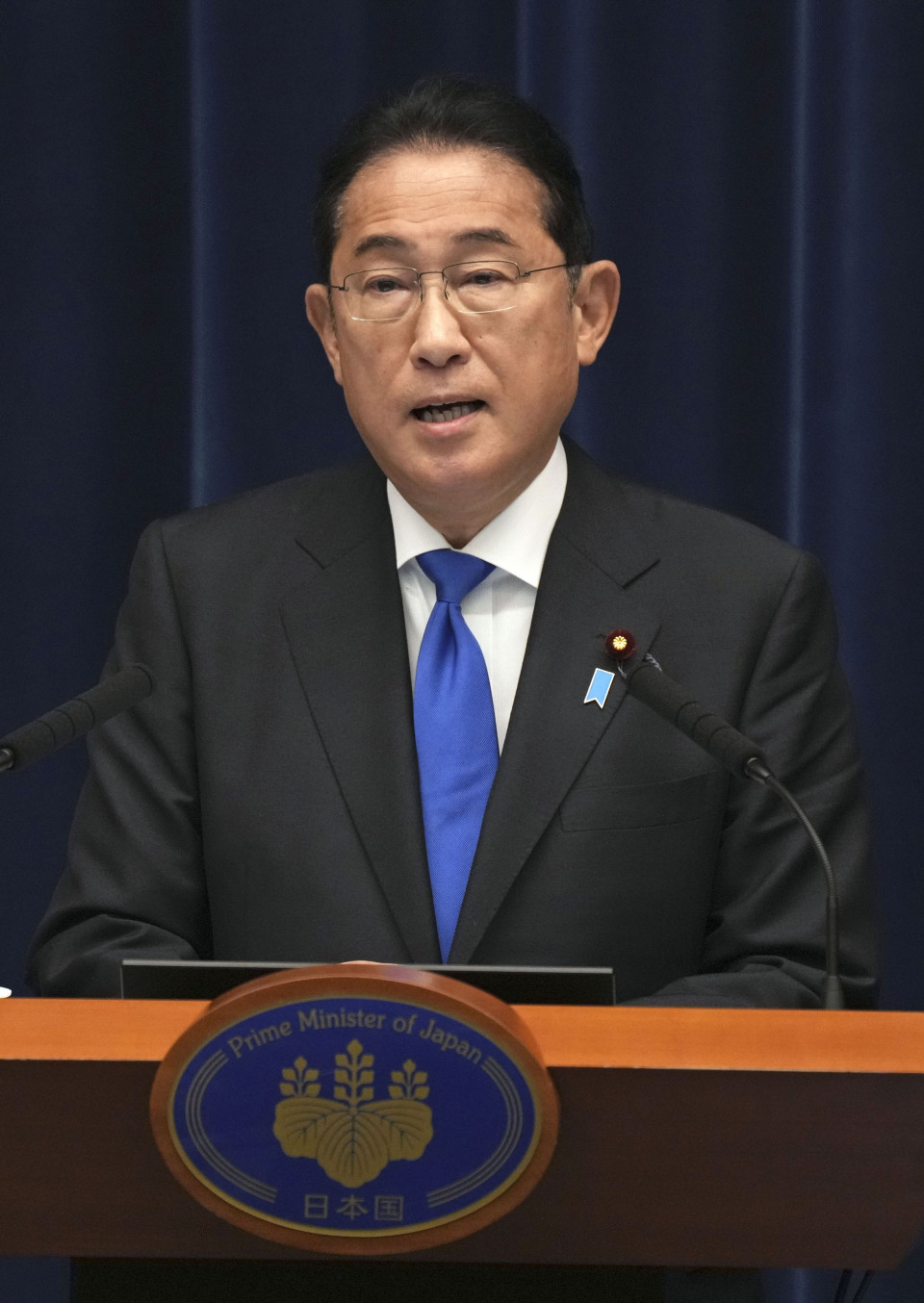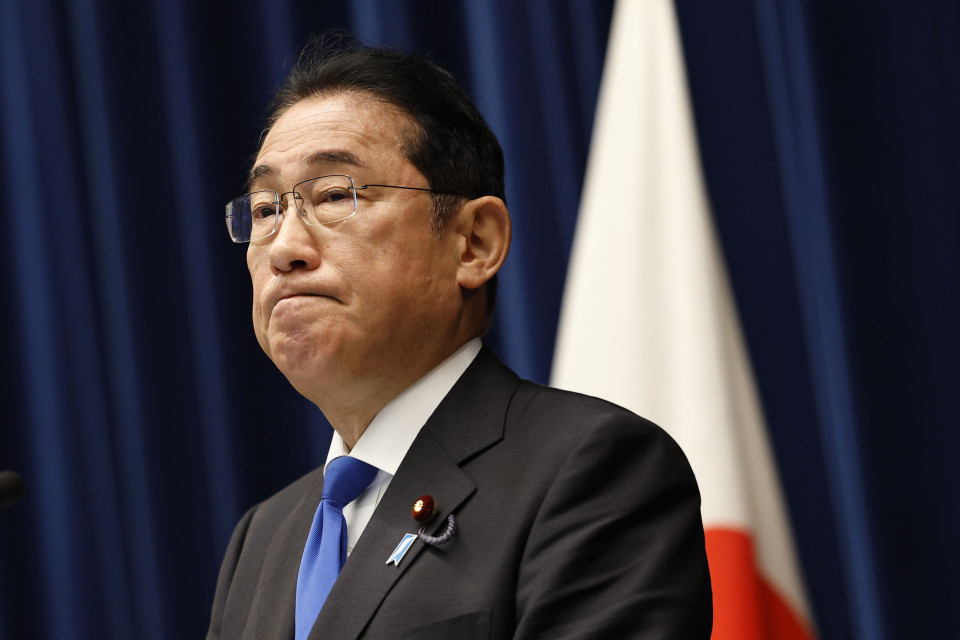Japanese Prime Minister Fumio Kishida on Wednesday set the stage for his departure as premier after three years in power by announcing he will not run in the ruling Liberal Democratic Party's presidential race next month to take responsibility for a slush funds scandal.
The sudden announcement came as Kishida's Cabinet stepped up disaster preparedness after the weather agency last week issued its first-ever advisory warning of the increased risk of a megaquake along the Nankai Trough that stretches from central to southwestern Japan in the Pacific.
"As a first step to impress on the public that the LDP has changed, I have decided not to run in the presidential race," Kishida said at a press conference at the prime minister's office, adding he had made the choice at a time when he was free of immediate diplomatic commitments.

LDP lawmakers "should work as one" under a new leader to restore public trust in politics and address various challenges such as implementing measures to curb the declining birthrate in an aging society and to bolster defense capabilities, he said.
Kishida, who hosted the Group of Seven summit in his home constituency of Hiroshima in 2023, has seen the approval ratings for his Cabinet, launched in October 2021, plunge to the 20 percent range in the wake of the scandal, which first broke late last year.
The eighth premier since 1945 to reach 1,000 days in office, Kishida said he will continue to serve as a "rank-and-file" LDP lawmaker, while declining to comment on who would be the best choice for next party chief and prime minister.
Both Kishida and his immediate predecessor Yoshihide Suga were forced to give up seeking reelection as LDP leader, making former Prime Minister Shinzo Abe, who resigned in September 2020, the last LDP chief to win reelection.
Despite his unpopularity, Kishida had been keen to secure reelection in the leadership race. But calls had been growing within the LDP for him to resign amid fears over how the LDP would fare in the next general election under his leadership, political pundits said.
While a senior LDP lawmaker said Kishida's decision was "worthy of praise" and he should no longer be accused of being "irresponsible," opposition parties suspect a snap election could be called shortly after the new prime minister takes office.
Kenta Izumi, leader of the main opposition Constitutional Democratic Party of Japan, said, "People should be not be deceived by the LDP's strategy to make them forget the past so it can maintain its grip on power." The CDPJ is also scheduled to hold its leadership race in September.

The LDP has come under intense scrutiny after some of its factions, including the largest one formerly led by the late Abe, neglected to report portions of their income from fundraising parties and created slush funds for years for their members.
Kishida disbanded his faction to set an example for others, while punishing veteran lawmakers who were close to Abe over the scandal. The LDP, however, suffered a crushing defeat in three House of Representatives by-elections in April.
Although Kishida managed to secure the enactment of a revised political funds control law, opposition parties say it left loopholes that will enable politicians to continue accumulating slush funds.
So far, former Defense Minister Shigeru Ishiba, who is popular with the public, has expressed his intention to run in the LDP presidential election. Ishiba previously served as LDP secretary general, the No. 2 figure within the ruling party.
Digital Minister Taro Kono, a reform-minded maverick and social media-savvy lawmaker, has informed LDP Vice President Taro Aso, a former prime minister, that he intends to run in the race, according to a source familiar with the matter.
LDP Secretary General Toshimitu Motegi, Economic Security Minister Sanae Takaichi, former Environment Minister Shinjiro Koizumi and former Economic Security Minister Takayuki Kobayashi are also among those who may join the race.
After taking over from Suga, who stepped down following criticism of his handling of the COVID-19 pandemic, Kishida led the LDP to a comfortable majority in the lower house election in late October 2021.
In July 2022, the LDP also won the House of Councillors election under Kishida. During the official campaign, Abe, who was Japan's longest-serving prime minister, was assassinated by a lone gunman who held a grudge against the Unification Church.
The revelation of suspicious ties between the controversial religious group, established in South Korea by a staunch anti-communist in 1954, and LDP lawmakers also triggered a plunge in the approval ratings for Kishida's Cabinet.
Among key decisions taken by the Kishida Cabinet, the government in December 2022 decided to allow Japan to acquire the capability to strike enemy bases and to double defense spending in a dramatic shift in postwar security policy under the country's war-renouncing Constitution.
In diplomacy, Kishida has made efforts to improve Japan-South Korea relations, which had deteriorated to their worst level in decades over a long-standing wartime labor compensation dispute, after conservative President Yoon Suk Yeol took office in May 2022.
In the run-up to the G7 summit in Hiroshima, Kishida, who had served as foreign minister for more than four years, made a surprise visit in May 2023 to Ukraine, under invasion by Russia since February 2022, for talks with President Volodymyr Zelenskyy.
Related coverage:
Charges dropped against Kishida, other LDP members in slush fund case
Japan ruling party lawmaker's offices searched over election law violation
Japan's top admiral steps down as SDF hit by scandals
 By Satoshi Iizuka,
By Satoshi Iizuka,









